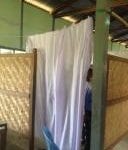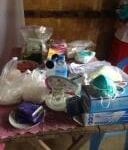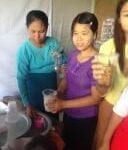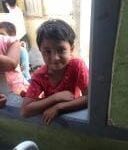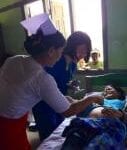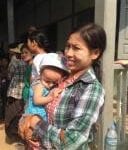Written by Thu Tran, MD,FACOG
May 2, 2014
Today we were so happy to go to an outreach clinic about an hour away from the Amara hotel. The roads took us to the countryside full of tiny grass huts and Myanmar’s typical red dirt. The skinny buffaloes were working hard in the field. Every living thing in Myanmar seems to be so skinny, from the people to the dogs to the buffalos, and even the bean sprouts used for its national dishes. I have never seen such thin sprouts!
We arrived at the clinic around 9 a.m. and, like the other outreach clinics, the courtyard was already packed with people. A tent with purple drapes had been set up with a loud speaker and rows of wooden chairs for the villagers. There was a sign at the stage with the words “community health” in both English and Burmese. Again, we were the curiosity, the center of attention. Each of us was given a fragrant jasmine lei. Within several minutes, Dr. Ko Ko Maw, the Burmese dentist who has been among our guides, tapped my shoulder to let me know the local TV station wanted to interview me. I asked if he wanted a man instead but he shook his head and let me know they planned to interview the men later.
I was asked a series of questions including how I felt about their country and what I thought I could do for their healthcare system. I told the interviewer how it was an honor for me to be there and how I hoped I could show them some methods to effectively lower their maternal and newborn mortality rates. I told them that if I could save even one life, I would feel that my time in Myanmar was worthwhile. As Dr. Ko Ko Maw translated what I said, I could see their big smiles. I must have said the right things.
If you want to see me and Mylene as we appeared on the Myanmar TV that night, you can enter this link into your browser:
You won’t be able to understand most of what I said, as the translation was loud and drowned out my voice.
As my clinic started, I saw a long line of pregnant women. Either this village was overpopulated or almost every woman from the 19 year-old to the 40 year-old was pregnant! None of my interpreters spoke English well. In fact, there was almost no interpreter who understood much English. I used many hand motions and facial expressions to get my interpreter to understand me.
At one point, I was telling the nurse and interpreter to tell a patient how she should eat more fish during pregnancy, as it’s a cheaper source of protein in Myanmar. As she turned toward the patient, I could hear her in her Burmese accent:
“Eat fish! Eat fish!”
Couldn’t I have said that? The poor patient was nodding her head but her eyes couldn’t hide her confusion. I was laughing inside as I reached for the brochure of nutrition I brought with a picture of a piece of salmon on the cover. Pictures spoke more than words that day.
Again, there was no privacy at all, with many of the pregnant women filling up the little exam room, standing close to each other as If they were watching a live show. It’s ironic that in the U.S., a patient’s privacy is considered so important that I, for example, would be fined heavily and might be even suspended from the medical staff at a hospital if I happened to check on my relative’s or my own lab work!
Before embarking on this trip, I recently had to go online to take a 20-minute course and test on patient privacy matters. I had to pass the test at the end with a minimal score of 80% correct! How many things in life do you think you have to get 80% correct to pass? It was a test designed for people living in Lake Wobegon! Just imagine how the designer of this test would have reacted to the patient privacy realities in Myanmar i.e. No privacy! He or she would have had chest pain!
A young woman told me how nauseous she has been since pregnancy. The only way I knew she was having nausea was by her hand motion, as she covered her mouth and jerked her head forward. I should have thought about giving her some Zofran tablets. Instead, I was thinking how natural this culture is and how patients probably would appreciate taking ginger instead of medications.
Nobody understood the term “ginger.” I frantically tried to draw a photo of a ginger root but my picture was not recognized. I was too exhausted that day to be a good artist. My ginger root looked more like a dog’s waste.
“Ginger? Ginger?” Like a multiple echo of my voice, all the pregnant women and nurses repeated the word “ginger” in puzzlement. “Ginger! Ginger!” They looked at each other again. Their accent was not bad but still no hope of them understanding what I meant to say.
I made all of them wait as I walked out to the dental area where an NGO woman in her fifties was sitting at a make shift desk. I asked her how to say” ginger” in Burmese.
Without hesitation she said:
“Ging ging! It’s called Ging Ging!”
Ginger is called “Ging-Ging”! Are you serious? Why didn’t they figure that out?
I walked back into my make shift office and said loudly:
“Ginger is Ging-Ging !”
“Ging Ging …oh… Ging Ging!” They were laughing and nodding their heads!
Wasn’t that crazy or what?
The day was so hot two staff members had to fan me with some papers. The children were hanging out at the window, sticking their heads into the room. They were fascinated with my fetal doppler as I tried to keep the sound on at its maximum volume because of the noises from the adjacent rooms where the other specialists were seeing patients. Sometimes I would raise the machine toward the window so the children could see the picture of a little heart dancing with the beats of the baby’s heart. It also registered the rate of the heart beats per minute. The children squealed in delight and the patient herself could not hide the joy of hearing her baby’s heart for the first time.
I reached into my backpack and pulled out my trail mix and protein bars. There were just too many kids for just the few bars left!
I let the first child pinch a little piece off a bar. The next child watched carefully before he or she would take off another piece. They were not greedy children despite their poverty. Put my nephews into this situation and each bar would serve a maximum of two kids!
The children each looked at their piece carefully before the first child took his first bite. He gave me a big grin and I gave him a thumbs up. Like a charm, the rest of the kids started eating their trail mix treats as everyone in the room was laughing.
The room was so hot I had to stop between every few patients to wipe my face with the baby wipes I brought from home. I was the only one who seemed to sweat. The crowd looked curious as I was wiping my face.
“Would you like to wipe your face?”
I asked a woman who stood near me. She looked tired. The nurse was translating. The patient was hesitant before reaching into the package and pulling out a wipe. She smelled it first, looking pleased before wiping her face with it. The crowd was giggling as each woman came up to the desk and helped herself to the wipes. The package was gone by the end of the day.
I had so many patients I decided to skip lunch again. I know we doctors have to take care of ourselves so we can take care of our patients, but with the fiery hot sun here, it’s almost absurd to take the luxury of having lunch while the patients who came from so far away would have to sit in that sun and wait for me. Many people in the third world can eat only a few times a week so I figured skipping a few lunches here wouldn’t kill me. It would give me more time to see everyone who showed up – I hoped.
I was surprised the first day in the clinic of Myanmar that, unlike my patients at home, here, they don’t make appointments ahead of time. My gynecology patients make their appointments several months ahead of time and the pregnant ones make their appointments two weeks to a month ahead of time depending on when they have to return to the office.
In Myanmar, I was told by a medical officer, there are almost no telephones in private homes unless one is part of the wealthy class. Patients can only show up and be seen within the designated time for the clinic. When the physicians decide to break for lunch, the patients just have to wait.
Seeing how I had no lunch, a nurse brought me a cup of fresh coconut juice. In the backyard, a group of men were breaking coconuts all morning for us. I took a sip and made a dramatic gesture showing how much I liked it, with my hand over my chest and my eyes looking up the ceiling. When I like something, especially food, I can be quite dramatic. Before long, another woman entered my room with a huge pot full of coconut juice. See what you can get when you act dramatic like me? I was laughing as they continued to pour more coconut juice into my cup every time I finished a cup. I realized I must have been dehydrated as I had no urge to go to the restroom all day. That heat was taking a toll on me.
In the afternoon, Sophie sent me a 49 year-old patient who had experienced constant vaginal bleeding for several months. She looked lethargic and lost. There was almost a sadness in her eyes. I am one of those who believe you can tell a lot about a person by looking at her eyes.
Everyone in the room was staring at her when she lay down on the bed in my exam room. I immediately asked for some privacy and the nurses ushered all the pregnant women out. They left the room as they glanced at the woman one last time, probably sensing something serious. She was staring at the ceiling, probably wondering if she should look at me or smile at the crowd. She was my first gynecology patient in that big crowd of pregnant people.
I placed a plastic speculum, one of the 40 I brought for my trip, into her vaginal canal. It immediately hit something hard within a few centimeters into the canal. Something was preventing the speculum from entering the vagina, I said to myself. What could it be?
As my two fingers barely entered the vagina, I could feel a mass, a hard mass a little bigger than an apple. It had replaced her cervix. It sat there like a small head of a baby, except it was irregular in shape.
I asked the nurse to turn on her flashlight. There were no exam lights in any of the Myanmar clinics I visited.
As the flashlight was turned on, I saw the problem. There it was, a monstrous ulcerating mass which forced the speculum out of the vagina. It was staring at me like an angel of death in that last hour of life, arrogantly asking me:
“What can you do to me now?”
It was laughing at me and the woman, who was still stoic on her back, with her longyi pulled up to avoid the blood coming out from her vagina.
I quickly grabbed some feminine pads and gave them to her, motioning to her what to do with them. I had brought these from my office at home too.
Immediately, I called Dr Ko Ko Maw into the room to tell him how I had found another demon, another cervical cancer, the fourth one in less than a week and a half!
As he was talking to the patient and her husband who was as skinny as she, I quietly gathered some iron supplements and some prenatal vitamin samples. I had run out of regular vitamins, but the prenatal ones will give her all the iron she needed as she had been bleeding for a few months, I reasoned to myself. Didn’t she have any pain, or she had such a hard life that pain was always a natural part of it?
The room was steaming hot all that time. I felt a bit suffocated as I was staring at Dr Ko Ko Maw still answering the patient’s husband’s questions. She was stoic and silent the whole time. Her fate was to be determined not by her.
Suddenly, and I couldn’t explain why, I saw the image of Martin Sheen sitting on a boat in Vietnam. It was a scene in the movie “Apocalypse Now.” I don’t remember if I was already in college by then, but I remember how this scene really bothered me. At the time, the Vietnam war was not so much a distant memory. I could tell how good Sheen was as an actor, as I could feel a mixed emotion of anger and sadness in him. The war was getting under his skin, as the surreal scene in that steamy hot room of the makeshift clinic was getting under my skin.
I took a few sips of coconut juice and even ate some of the coconut particles in the juice. I needed some sugar to keep me awake and standing. I didn’t want to pass out. It was the woman who should get help, not me. I took some slow deep breaths and kept reminding myself to be strong to overcome the sudden urge of nausea.
After the woman left with her husband, giving me a little grateful smile, a nurse walked into the room with a form for me to fill in.
“Consultant, consultant,” she must have repeated the term at least five times.
I filled out the form explaining why the patient would need to see a gynecology oncologist. These specialists can only be found in Yangon, the former capital at least ten hours away.
“How much will the consult cost?” I asked the nurse,
“Five thousand kyat” she said.
Five thousand kyat? That’s $5, the price of a Starbucks coffee. However, $5 can be expensive for many people in this impoverished area.
I reached for my backpack and took out five thousand kyat (pronounced chat) as the nurse kept pushing my hand away, trying to inform me that the NGO would try to pay for the patient’s consult. Someone will pay for the consult, but will the consultant be able to take that monster out?
“Where you live should not decide whether you live or you die.”
That was one of Bono of U2 ‘s famous lines, with which I wholeheartedly agreed. Ideally, everybody deserves a happy and healthy life, but in reality, the concept doesn’t fly in many impoverished parts of the world. Until we all recognize that beneath the shallow shades of race, religions, classes, education etc…we are all brothers and sisters of the world, this concept will never fly!
In the evening, some of us skipped dinner with the group and dined together in the hotel. The food was very good compared to the usual restaurants the team had taken us to for dinner. I had a bowl of spicy Tom Yum soup and a Thai beef salad. We talked about happiness and what it means to these impoverished citizens of the world as compared to us in the industrialized societies. Simplicity might be a bigger blessing than we can understand. We also discussed how we westerners might have more stress than we think, but the Myanmar people who get access to the internet might see how we live and think we are happier than they. People often are not content with their lives despite their condition. The truth might be that no life is perfect. It is a system full of exchanges and that might be the secret truth of “justice.” Somehow, I still believe hardship gives people little time to think about happiness. I can’t imagine a single one of the patients I saw in the clinic today having time to stop and wonder if she was happy?
That night, Noel called my room to inform me how she and Eliud had just seen me, Mylene and several more members of the team on the evening news. We were the new celebrities of the day in this new capital of Myanmar. I planned to send the link to my family and friends to see me and Mylene on Myanmar TV! I am just kidding of course about being a celebrity here. There are not too many families who own TV sets so it is likely that only a few saw us that night. Most homes in the rural areas don’t have electricity at all so there was no chance they would have seen us on TV. How I wish the patients in the outreach clinics could have seen me on the news. If I knew they were able to see me and were watching, I would have added another sentence at the end of my interview:
“Women, do not lose hope. Your healthcare doesn’t have to be this way forever. We can help!”
It was a satisfying day as I thought we had made a difference. Again, I did not save anybody’s life; I only brought the pregnant patients a moment of joy.
“God is in the slums, in the cardboard boxes where the poor play house. God is in the silence of a mother who has infected her child with a virus that will end both their lives. God is in the cries heard under the ruble of war. God is in the debris of wasted opportunity and lives, and God is with us if we are with them.”
Bono – U2
Tags:





